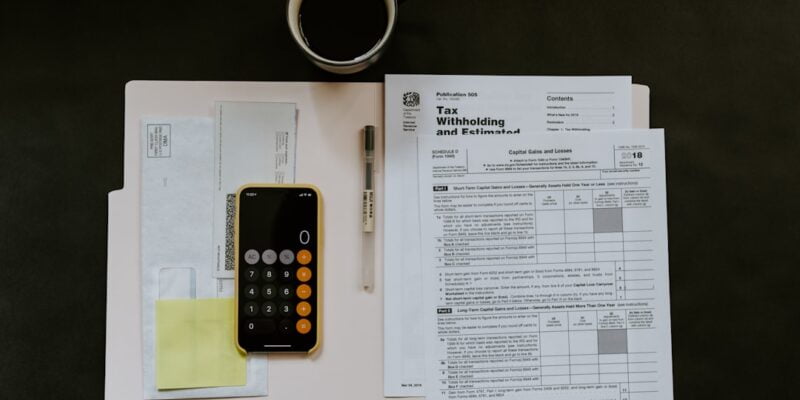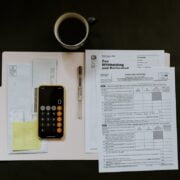
Mastering Tax Accounting: Tips and Tricks for Small Business Owners
Tax accounting is a crucial aspect of running a small business. It involves managing and reporting financial information to ensure compliance with tax laws and regulations. For small business owners, understanding the basics of tax accounting and implementing effective strategies can help minimize tax liabilities and maximize deductions and credits. In this blog post, we will explore various topics related to tax accounting for small business owners, including the basics of tax accounting, strategies for managing tax accounting, maximizing deductions and credits, staying compliant with tax laws, streamlining tax accounting processes, accurate record-keeping and bookkeeping, avoiding common tax accounting mistakes, preparing for tax season, working with a tax professional, and utilizing technology to simplify tax accounting tasks.
Key Takeaways
- Tax accounting is essential for small business owners to understand
- Effective tax accounting strategies can help manage taxes for your business
- Maximizing deductions and credits can save money on small business taxes
- Staying compliant with tax laws and regulations is crucial for avoiding penalties
- Streamlining tax accounting processes can improve efficiency for small businesses
Understanding the Basics of Tax Accounting for Small Business Owners
Tax accounting refers to the process of preparing and filing tax returns for a business. It involves calculating taxable income, determining tax liabilities, and ensuring compliance with tax laws and regulations. Small businesses are typically subject to various types of taxes, including income taxes, payroll taxes, sales taxes, and self-employment taxes.
There are different methods of tax accounting that small businesses can use. The two most common methods are cash basis accounting and accrual basis accounting. Cash basis accounting records revenue when it is received and expenses when they are paid. Accrual basis accounting records revenue when it is earned and expenses when they are incurred, regardless of when the money is actually received or paid.
Effective Strategies for Managing Tax Accounting for Your Business
Managing tax accounting can be overwhelming for small business owners. However, implementing effective strategies can help simplify the process and ensure compliance with tax laws.
Creating a tax calendar is an essential strategy for managing tax accounting. This involves keeping track of important deadlines for filing tax returns, making estimated tax payments, and submitting required forms and documents. By having a clear timeline of tasks to complete, small business owners can avoid penalties and interest charges for late or incorrect filings.
Hiring a tax professional is another effective strategy for managing tax accounting. Tax professionals have the knowledge and expertise to navigate complex tax laws and regulations. They can help small business owners identify deductions and credits, ensure accurate record-keeping, and minimize tax liabilities. Additionally, tax professionals can provide valuable advice and guidance on tax planning strategies to optimize financial outcomes.
Keeping accurate records is crucial for managing tax accounting. Small business owners should maintain organized and up-to-date financial records, including income statements, balance sheets, bank statements, receipts, invoices, and expense reports. Accurate record-keeping not only helps with tax compliance but also provides valuable information for making informed business decisions.
Using accounting software can streamline tax accounting processes for small business owners. Accounting software automates tasks such as tracking income and expenses, generating financial reports, and calculating tax liabilities. It also provides a centralized platform for storing financial data and facilitates collaboration with tax professionals or accountants.
Maximizing Deductions and Credits for Small Business Taxes
| Metrics | Description |
|---|---|
| Tax deductions | Expenses that can be subtracted from taxable income to reduce the amount of taxes owed. |
| Tax credits | Amounts that can be subtracted directly from the taxes owed, reducing the overall tax liability. |
| Business expenses | Costs incurred in the course of running a business, such as rent, utilities, and supplies. |
| Depreciation | The gradual decrease in value of an asset over time, which can be used as a tax deduction. |
| Employee benefits | Non-wage compensation provided to employees, such as health insurance and retirement plans. |
| Home office deduction | A deduction for the portion of a home used exclusively for business purposes. |
| Startup costs | Expenses incurred in starting a new business, such as legal fees and marketing expenses. |
| Research and development | Expenses related to developing new products or improving existing ones, which can be deducted or credited. |
Maximizing deductions and credits is an important aspect of tax accounting for small business owners. Deductible expenses are costs incurred in the course of running a business that can be subtracted from taxable income. Common deductible expenses for small businesses include rent or mortgage payments for business premises, utilities, office supplies, equipment purchases, employee wages and benefits, marketing expenses, professional fees, and travel expenses.
In addition to deductible expenses, small businesses may be eligible for various tax credits. Tax credits directly reduce the amount of taxes owed. Some common tax credits for small businesses include the Research and Development (R&D) Tax Credit, the Small Business Health Care Tax Credit, the Work Opportunity Tax Credit (WOTC), and the Energy-Efficient Commercial Buildings Tax Deduction.
To maximize deductions and credits, small business owners should keep detailed records of all eligible expenses and consult with a tax professional to ensure compliance with tax laws and regulations. It is also important to stay informed about changes in tax laws that may introduce new deductions or credits.
Staying Compliant with Tax Laws and Regulations
Staying compliant with tax laws and regulations is crucial for small business owners to avoid penalties, fines, and legal consequences. Tax laws and regulations can vary depending on the jurisdiction and the type of business. It is important for small business owners to familiarize themselves with the specific tax requirements applicable to their business.
To stay compliant, small business owners should keep accurate records of all financial transactions, including income, expenses, and assets. They should also maintain proper documentation to support deductions and credits claimed on tax returns. It is recommended to consult with a tax professional or accountant to ensure compliance with tax laws and regulations.
Non-compliance with tax laws can have serious consequences for small businesses. Penalties for late or incorrect filings can result in financial losses and damage to the business’s reputation. In some cases, non-compliance can lead to audits, investigations, or legal action by tax authorities. Small business owners should prioritize tax compliance to protect their business and maintain good standing with tax authorities.
Streamlining Your Tax Accounting Processes for Efficiency
Streamlining tax accounting processes can help small business owners save time, reduce errors, and improve efficiency. There are several strategies that can be implemented to streamline tax accounting tasks.
Automating tax accounting tasks is one effective strategy. Accounting software can automate repetitive tasks such as data entry, calculations, and report generation. This not only saves time but also reduces the risk of errors associated with manual data entry. Additionally, automation allows for real-time tracking of financial data, providing small business owners with up-to-date information for making informed decisions.
Outsourcing tax accounting tasks is another strategy for streamlining processes. Small business owners can hire external professionals or firms specializing in tax accounting to handle their tax-related responsibilities. Outsourcing allows small business owners to focus on core business activities while ensuring that tax accounting tasks are handled by experts.
To improve efficiency, small business owners should also establish standardized processes and workflows for tax accounting. This includes creating templates for financial reports, developing checklists for tax filing requirements, and implementing a system for organizing and storing financial records. By standardizing processes, small business owners can minimize errors, reduce duplication of efforts, and ensure consistency in tax accounting practices.
Tips for Accurate Record-Keeping and Bookkeeping
Accurate record-keeping and bookkeeping are essential for effective tax accounting. Small business owners should implement best practices to ensure that financial records are organized, up-to-date, and easily accessible.
Accurate record-keeping involves documenting all financial transactions in a systematic manner. This includes recording income from sales or services rendered, as well as expenses incurred for operating the business. Small business owners should keep track of all receipts, invoices, bank statements, and other relevant documents to support the recorded transactions.
Organizing financial records is crucial for efficient tax accounting. Small business owners should establish a filing system that categorizes documents based on their type or purpose. This makes it easier to locate specific records when needed. Digital storage solutions can also be used to store electronic copies of financial documents, ensuring that they are easily accessible and protected from loss or damage.
Bookkeeping involves maintaining accurate and up-to-date financial statements, including income statements, balance sheets, and cash flow statements. Small business owners should reconcile bank statements with their accounting records regularly to identify any discrepancies or errors. It is recommended to use accounting software or hire a professional bookkeeper to ensure accurate bookkeeping.
Avoiding Common Tax Accounting Mistakes
Small business owners often make common mistakes when it comes to tax accounting. These mistakes can result in penalties, interest charges, or missed opportunities for deductions or credits. By being aware of these mistakes and taking proactive measures to avoid them, small business owners can minimize the risk of financial losses and ensure compliance with tax laws.
One common mistake is failing to keep accurate and organized records. Without proper documentation, small business owners may struggle to support deductions or credits claimed on tax returns. It is important to maintain detailed records of all financial transactions and keep them organized for easy retrieval.
Another common mistake is mixing personal and business expenses. Small business owners should separate personal and business finances to ensure that only eligible business expenses are claimed as deductions. This includes having separate bank accounts, credit cards, and financial statements for personal and business use.
Failing to file tax returns on time is another common mistake. Small business owners should be aware of the filing deadlines for different types of taxes and ensure that they submit their returns before the due dates. Late filings can result in penalties and interest charges, which can add up over time.
Preparing for Tax Season: What Small Business Owners Need to Know
Tax season can be a stressful time for small business owners. Being prepared and organized can help alleviate some of the stress and ensure a smooth tax filing process.
Small business owners should start preparing for tax season well in advance. This includes gathering all necessary financial documents, such as income statements, expense reports, bank statements, receipts, and invoices. By having all the required documents ready, small business owners can avoid last-minute scrambling and potential errors.
It is also important to review tax laws and regulations that may have changed since the previous tax season. Tax laws are subject to updates and amendments, so small business owners should stay informed about any new requirements or deductions that may be applicable to their business.
Small business owners should consider consulting with a tax professional or accountant before filing their tax returns. A tax professional can review the financial records, identify potential deductions or credits, and provide guidance on tax planning strategies. They can also help ensure that all tax forms and documents are completed accurately and submitted on time.
Working with a Tax Professional: How to Choose the Right One for Your Business
Working with a tax professional can provide numerous benefits for small business owners. A tax professional has the knowledge and expertise to navigate complex tax laws and regulations, identify deductions and credits, and ensure compliance with tax requirements. When choosing a tax professional for your business, there are several factors to consider.
Firstly, consider the qualifications and experience of the tax professional. Look for certifications such as Certified Public Accountant (CPA) or Enrolled Agent (EA). These designations indicate that the tax professional has met certain educational and professional requirements.
Secondly, consider the specific expertise of the tax professional. Some tax professionals specialize in working with small businesses or specific industries. It is important to choose a tax professional who has experience in dealing with the unique tax challenges faced by small businesses.
Thirdly, consider the fees charged by the tax professional. Different tax professionals may have different fee structures, so it is important to understand how they charge for their services. Some tax professionals charge an hourly rate, while others may charge a flat fee or a percentage of the taxes saved.
Lastly, consider the level of communication and support provided by the tax professional. It is important to choose a tax professional who is responsive to your needs and can provide timely advice and guidance throughout the year, not just during tax season.
Utilizing Technology to Simplify Your Tax Accounting Tasks
Technology can play a significant role in simplifying tax accounting tasks for small business owners. Tax accounting software can automate repetitive tasks, streamline processes, and provide real-time access to financial data.
Tax accounting software offers various features that can benefit small business owners. These features include automated data entry, calculation of tax liabilities, generation of financial reports, and integration with other accounting systems or platforms. By automating tasks, small business owners can save time and reduce the risk of errors associated with manual data entry.
When choosing tax accounting software, small business owners should consider their specific needs and budget. There are different types of tax accounting software available, ranging from basic programs for simple tax calculations to more advanced solutions for complex tax requirements. It is important to choose a software that is user-friendly, compatible with existing systems, and provides adequate support and training.
Tax accounting is a critical aspect of running a small business. By understanding the basics of tax accounting, implementing effective strategies, maximizing deductions and credits, staying compliant with tax laws, streamlining processes, maintaining accurate records, avoiding common mistakes, preparing for tax season, working with a tax professional, and utilizing technology, small business owners can ensure compliance with tax laws and regulations while minimizing tax liabilities. It is important for small business owners to prioritize tax accounting and seek professional advice when needed to optimize financial outcomes and protect their business.
If you’re interested in tax accounting, you might also find this article on creating a healthy work-life balance habits for productivity and self-care quite relevant. It explores the importance of maintaining a balance between work and personal life to enhance overall well-being and effectiveness. Check it out here.
FAQs
What is tax accounting?
Tax accounting is the process of preparing and filing tax returns for individuals and businesses. It involves analyzing financial records, calculating taxes owed, and ensuring compliance with tax laws and regulations.
What are the benefits of tax accounting?
Tax accounting can help individuals and businesses save money by identifying deductions and credits that can reduce their tax liability. It can also help ensure compliance with tax laws and regulations, which can prevent costly penalties and legal issues.
What are some common tax accounting methods?
Some common tax accounting methods include cash basis accounting, accrual basis accounting, and hybrid accounting. Cash basis accounting records income and expenses when they are received or paid, while accrual basis accounting records income and expenses when they are earned or incurred. Hybrid accounting combines elements of both methods.
What are some common tax deductions?
Common tax deductions include charitable contributions, mortgage interest, state and local taxes, medical expenses, and business expenses. Deductions can vary depending on individual circumstances and tax laws.
What is the difference between tax accounting and financial accounting?
Tax accounting focuses on preparing and filing tax returns, while financial accounting focuses on recording and reporting financial transactions. Tax accounting is often more specialized and focused on compliance with tax laws and regulations, while financial accounting is more general and focused on providing financial information to stakeholders.


















